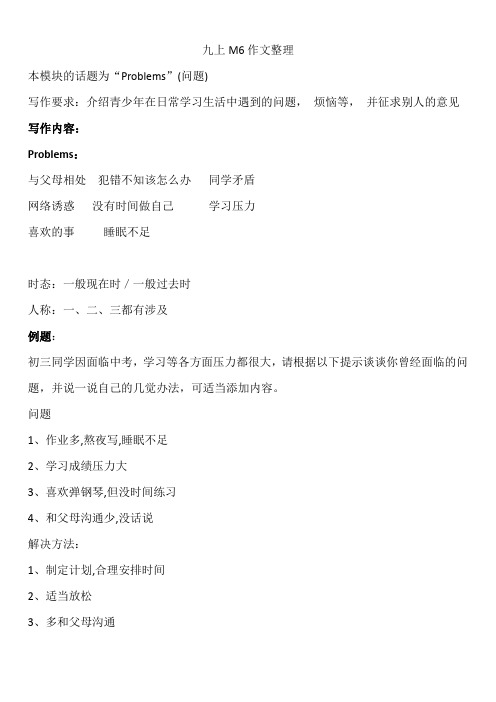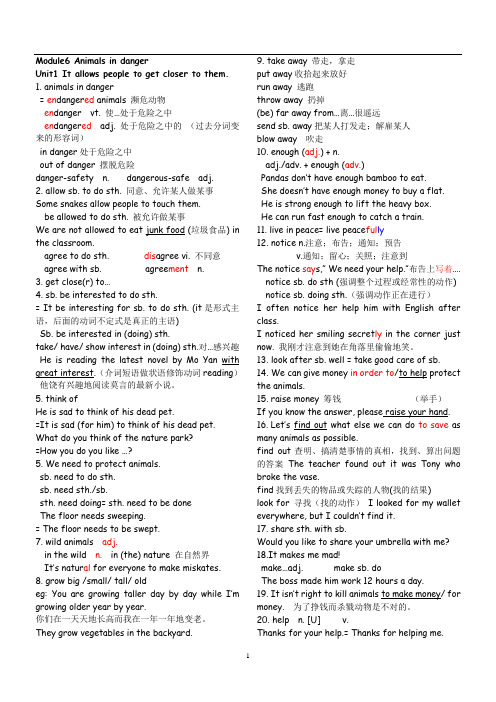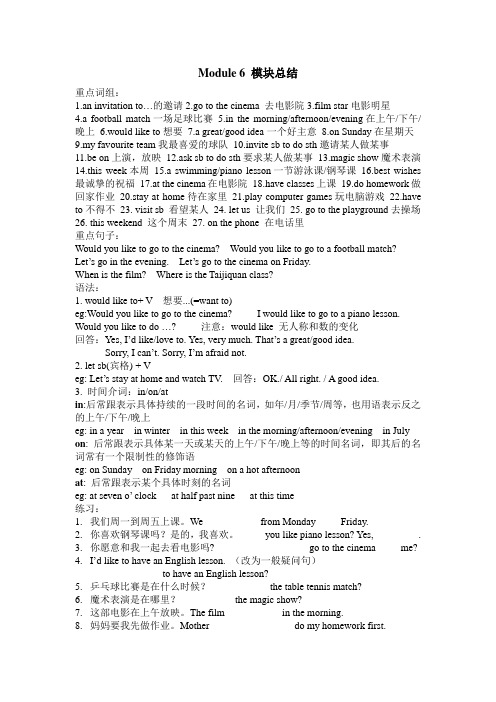module6整理
Module+6+Problems+作文整理 外研版九年级英语上册

九上M6作文整理本模块的话题为“Problems”(问题)写作要求:介绍青少年在日常学习生活中遇到的问题,烦恼等,并征求别人的意见写作内容:Problems:与父母相处犯错不知该怎么办同学矛盾网络诱惑没有时间做自己学习压力喜欢的事睡眠不足时态:一般现在时/一般过去时人称:一、二、三都有涉及例题:初三同学因面临中考,学习等各方面压力都很大,请根据以下提示谈谈你曾经面临的问题,并说一说自己的几觉办法,可适当添加内容。
问题1、作业多,熬夜写,睡眠不足2、学习成绩压力大3、喜欢弹钢琴,但没时间练习4、和父母沟通少,没话说解决方法:1、制定计划,合理安排时间2、适当放松3、多和父母沟通短语储备:1、in trouble 陷入困境2、as soon as 一…就…3、get into the habit of 养成…的习惯4、at least 至少5、communicate with sb 和某人交流6、be tired of 厌烦/厌倦…7、had better do sth 最好做某事8、be worried about=worry about 担心9、to do list人物清单10、try one's best to do sth 尽某人最大的努力做…11、be allowed to do sth 被允许做某事12、too much 太多13、be afraid of doing sth害怕做某事14、decide to do sth 决定做某事15、be sure确信开头句:(开篇点题,引出本文主旨)1、Everyone has their own trouble, so do I.2、I always meet many problems in my study and life. Now I want to share with you and tell you my ways of solving these problems.3、Many adults said that our children don't have worries, but actually we do have. Let's talk about them.中间句:(问题和措施分两端写)1、I feel nervous because…2、I have too much…to do, and I don't have time to rest.4、I love…but I don't have enough time to practise/do it.3、I'm really tired of…5、I'm not allowed to do sth.6、I'm afraid to do sth because…他人的问题:1、I'm sorry to hear that+对方遇到的问题2、I'm glad to receive your letter and give you my suggestions.(措施:如何解决这些问题,用到情态动词)1、First, I should/You should….2、Second, I asked my teacher and friends for some advice.3、Third, I decided to make some plans at the begining of the day.4、What's more, I will try my best to do sth.5、I found some proper ways to relax myself, such as…给他人提建议:1、First, you should…2、Second, you can ask your teacher or friends for some advice.3、What's more, you had better make some plans before studying.You should get into the habit of making plans before studying.5、If I were you, I would…6、I think it would be better if you…结尾句:(表明自己的决心/希望自己的意见对他人有用)1、All in all, the problems that we met are challenges, if we beat them, we will make a great progress.2、No matter what kind of difficulties I face, I will never give up.给他人提建议的话:1、I hope my suggestions can help you.2、I hope you like my suggestion.3、No matter what happens, please don't give up.范文:Many adults said that children don't have worries, but actually we do have. I always meet many problems in my study and life. Now I want to talk about them with you.As a middle school student, we have lots of homework to do.In order to finish my homework on time, I have to stay up late at night, so I don't have enough time to sleep. I have too much study pressure. And my parents don't understand me, we have little communication with each other. What's more, I love piano, but I don't have time to practise it, so I feel really sad about that.But what should I do? First, I will get into a habit of making plans for my study. I'd like toright way to relax myself, such as listening to music, watching TV or going out to have a walk. Third, I will communicate with my parents more often, I can tell them what happened in school or the book that I read.All in all, the problems that we met are challenges, if we beat them, we will become a better person.另外一种考察形式(来源于网络)下面是某报刊登出的一封读者来信,请你以编者Cathy的身份给这位同学回信,并针对她的问题给出合理的建议。
Module 6 知识点

Unit 1 It allows people to get closer to them一、重点短语1. allow sb to do sth 允许某人做某事2. need to do sth. 需要做某事3. be in danger 处于危险中4. live in the forest 住在森林里5. be interested to do sth. 对做某事感兴趣6. the Wolong Panda Reserve 卧龙熊猫保护区7. get close to 接近8. think of 想出9. protect animals 保护动物10. take away 拿走,夺去11. enough clean water 足够干净的水12. live in peace 和平地生活13. save animals 挽救动物14. look after 照顾,保管15. raise money 筹钱16. what else 别的什么17. as many animals as possible 尽可能多的动物二、重点句型1. I saw the pandas at last!我终于看到熊猫了!2. It allows people to get closer to them.它允许人们离它们更近。
3. It's sad to think of the pandas and other animals in danger.想起熊猫和其他濒危动物,(我)就很难过。
4. Many wild animals don't have a safe place to live, because villages and farms are growing bigger and are taking away their land and forests.许多野生动物没有安全的地方可生活,因为村庄和农场越来越大,侵占了它们的土地和森林。
(完整版)外研社英语八年级上M6知识点整理

Module6 Animals in dangerUnit1 It allows people to get closer to them.1. animals in danger= en danger ed animals 濒危动物en danger vt. 使…处于危险之中en danger ed adj. 处于危险之中的(过去分词变来的形容词)in danger处于危险之中out of danger 摆脱危险danger-safety n. dangerous-safe adj.2. allow sb. to do sth. 同意、允许某人做某事Some snakes allow people to touch them.be allowed to do sth. 被允许做某事We are not allowed to eat junk food (垃圾食品) in the classroom.agree to do sth. dis agree vi. 不同意agree with sb. agree ment n.3. get close(r) to…4. sb. be interested to do sth.= It be interesting for sb. to do sth. (it是形式主语,后面的动词不定式是真正的主语)Sb. be interested in (doing) sth.take/ have/ show interest in (doing) sth.对…感兴趣He is reading the latest novel by Mo Yan with great interest.(介词短语做状语修饰动词reading)他饶有兴趣地阅读莫言的最新小说。
5. think ofHe is sad to think of his dead pet.=It is sad (for him) to think of his dead pet. What do you think of the nature park?=How you do you like …?5.We need to protect animals.sb. need to do sth.sb. need sth./sb.sth. need doing= sth. need to be doneThe floor needs sweeping.= The floor needs to be swept.7.wild animals adj.in the wild n. in (the) nature 在自然界It’s natur al for everyone to make miskates. 8.grow big /small/ tall/ oldeg: You are growing taller day by day while I’m growing older year by year.你们在一天天地长高而我在一年一年地变老。
外研版初三英语上册 Module 6 重点难点易错点整理

难点条件状语从句条件状语从句就是用以表示“在某种条件下,会……”,引导词主要有if, unless, as/so long as, on condition that, provided, suppose, supposing 等..主句用一般将来时,if或unless引导的条件状语从句用一般现在时。
注意:[主将从现原则]在含有条件状语从句的复合句中,表示将来时态,主句是一般将来时态,祈使句或情态动词,从句要用现在时态。
一、if引导的条件状语从句1)If you ask him, he will help you.2)If you fail in the exam, you will let him down.3)If you want to go, please tell me.4)If you want to know more about it, you can call me.if引导的条件状语从句既可以将从句放前面也可以将从句放后面(如果天下雨,我们就不玩了)If it rains, we will stop playing.转为We will stop playing if it rains.另外,if从句还表示不可实现的条件或根本不可能存在的条件,也就是一种虚拟的条件或假设,从句多用一般过去时或过去完成时。
如:If I were you,I would invite him to the party.I would have arrived much earlier if I had not been caught in the traffic.二、其他连词引导的条件状语从句1.unless = if...not. conj.除非,若不,除非在……的时候You will fail to arrive there in time unless you start earlier.如果你不早点动身,你就不能及时赶到那儿。
Module 6 模块总结

Module 6 模块总结重点词组:1.an invitation to…的邀请2.go to the cinema 去电影院3.film star电影明星4.a football match一场足球比赛5.in the morning/afternoon/evening在上午/下午/晚上6.would like to想要7.a great/good idea一个好主意8.on Sunday在星期天9.my favourite team我最喜爱的球队10.invite sb to do sth邀请某人做某事11.be on上演,放映12.ask sb to do sth要求某人做某事13.magic show魔术表演14.this week本周15.a swimming/piano lesson一节游泳课/钢琴课16.best wishes 最诚挚的祝福17.at the cinema在电影院18.have classes上课19.do homework做回家作业20.stay at home待在家里21.play computer games玩电脑游戏22.have to不得不23. visit sb 看望某人24. let us 让我们25. go to the playground去操场26. this weekend 这个周末27. on the phone 在电话里重点句子:Would you like to go to the cinema? Would you like to go to a football match? Let’s go in the evening. Let’s go to the cinema on Friday.When is the film? Where is the Taijiquan class?语法:1. would like to+ V 想要...(=want to)eg:Would you like to go to the cinema? I would like to go to a piano lesson. Would you like to do …? 注意:would like 无人称和数的变化回答:Yes, I’d like/love to. Yes, very much. That’s a great/good idea.Sorry, I can’t. Sorry, I’m afraid not.2. let sb(宾格) + Veg: Let’s stay at home and watch TV. 回答:OK./ All right. / A good idea.3. 时间介词:in/on/atin:后常跟表示具体持续的一段时间的名词,如年/月/季节/周等,也用语表示反之的上午/下午/晚上eg: in a year in winter in this week in the morning/afternoon/evening in July on: 后常跟表示具体某一天或某天的上午/下午/晚上等的时间名词,即其后的名词常有一个限制性的修饰语eg: on Sunday on Friday morning on a hot afternoonat: 后常跟表示某个具体时刻的名词eg: at seven o’ clock at half past nine at this time练习:1.我们周一到周五上课。
六年级上册英语Module 6 模块小结外研版

Warming up
I’m happy! I’ve got a new pen friend. Here is an email and now I can press “send”. My pen friend’s in England. Her name is Sue. Give me your address. You can be my pen friend too.
Warming up
句型 My living room is very spacious and bright. 我的客厅非常宽敞明亮。 There is also a small round table where I sometimes put the book I am reading. 还有一个小圆桌,我有时把我正在读的书放在那里。 The living room is very warm in winter because it has got a fireplace. 客厅在冬天很暖和,因为它有一个壁炉。 There are four windows and two of them have got lovely violet curtains I made myself. 这里有四扇窗户,其中两扇有我自己做的可爱的紫色窗帘。
Japanese 日本的
Warming up
句型 Daming has got a Chinese dragon kite and we often fly in the park. 大明有一个中国龙风筝,我们经常在公园里放风筝。 Have you got a book about the US? 你有一本关于美国的书吗? What book have you got? 你有什么书?
Module 6 重点知识点
Module 6 An invitation to the cinema重点单词:invitation(n.)邀请invite (v.) 邀请cinema 电影院stadium 体育场match(n. matches)比赛team 队伍week 星期Saturday 星期六Wednesday星期三idea想法,主意magic魔术show表演place地点price价格theatre剧院plan (n./v.) 计划playground 操场stay停留重点词组go to the cinema 去看电影film star影星go to a football match 去看足球赛this week本周have swimming lesson 上游泳课have classes 上课at Garden Hotel 在花园酒店at New Times Cinema在新时代电影院visit grandma 看望奶奶invite friends to do something 邀请朋友做某事stay at home 呆在家里play computer games 玩电脑游戏重点句子:Would you like to go to the cinema? 你想去看电影吗?That’s a great idea!那是个好主意!Let’s go in the evening. 让我们晚上去吧。
He’s my favourite film star. 他是我最喜欢的影星。
Daming invites Tony to the cinema. 大明邀请托尼去看电影。
They’re going to see a Jackie Chan film. 他们要去看成龙的电影。
The film is on in themorning. 电影在早上上映。
Tony asks Daming to go to a basketball match with him. 托尼让大明和他去看篮球赛。
英语模块6知识点总结
英语模块6知识点总结In Module 6, we covered a variety of topics that are important for understanding English language and grammar. In this summary, we will review the key knowledge points that were covered in this module.1. Present Perfect tenseThe present perfect tense is used to talk about actions or events that have just been completed or that happened at an unspecified time in the past. It is formed with the present tense of the verb "to have" followed by the past participle of the main verb.For example:- I have eaten lunch.- She has lived in Paris for five years.2. Past Perfect tenseThe past perfect tense is used to talk about actions or events that happened before another action or event in the past. It is formed with the past tense of the verb "to have" followed by the past participle of the main verb.For example:- I had finished my homework before I went to bed.- By the time he arrived, the party had already started.3. Future Perfect tenseThe future perfect tense is used to talk about actions or events that will be completed at a specific time in the future. It is formed with the future tense of the verb "to have" followed by the past participle of the main verb.For example:- By this time next year, I will have graduated from college.- They will have been married for 25 years by their anniversary.4. Passive VoiceThe passive voice is used to focus on the action performed, rather than the person or thing performing the action. It is formed with the appropriate tense of the verb "to be" followed by the past participle of the main verb.For example:- The book was written by the author.- The house was painted by the workers.5. Modal verbsModal verbs are used to indicate possibility, permission, ability, potential, and obligation. The most common modal verbs are can, could, may, might, must, shall, should, will, would. For example:- I can speak English fluently.- You should study for the exam.6. Reported SpeechReported speech is used to report what someone else has said. It is usually introduced by a reporting verb and often there are changes to verb forms, pronouns, and time expressions. For example:- Direct speech: She said, "I am going to the supermarket."- Reported speech: She said that she was going to the supermarket.7. ConditionalsThere are four main types of conditional sentences in English, each expressing a different degree of likelihood. These are zero conditional, first conditional, second conditional, and third conditional.- Zero conditional: used for general truths, facts, or scientific laws.- First conditional: used to talk about possible future events based on current circumstances. - Second conditional: used to talk about hypothetical or unlikely future events.- Third conditional: used to talk about hypothetical past events that did not happen.8. Phrasal VerbsPhrasal verbs are combinations of a verb and one or more particles (prepositions or adverbs). The meaning of a phrasal verb is often different from the meaning of its individual parts.For example:- Turn off: to stop the operation of a device.- Look after: to take care of someone or something.9. IdiomsIdioms are expressions that have a figurative meaning that is different from the literal meaning of the individual words. They are commonly used in informal language and can be difficult for non-native speakers to understand.For example:- Kick the bucket: to die.- Hit the nail on the head: to describe exactly what is true.10. Word FormationWord formation is the process of creating new words from existing ones by adding prefixes or suffixes, or by changing the word's form or pronunciation. Understanding word formation is important for expanding vocabulary and understanding how words are related to each other.For example:- Happy (adjective) + ness (suffix) = happiness (noun)- Power (noun) + ful (suffix) = powerful (adjective)In conclusion, Module 6 covered a wide range of important topics related to English language and grammar. Understanding these knowledge points is essential for improving language skills and becoming a proficient English speaker and writer. By mastering the present perfect, past perfect, and future perfect tenses, as well as the passive voice, modal verbs, reported speech, conditionals, phrasal verbs, idioms, and word formation, learners can strengthen their grasp of the language and communicate effectively in various contexts.。
九年级上册外研版英语module6知识点
九年级上册外研版英语module6知识点Module 6 of the English textbook for ninth grade students studying under the Foreign Language Press is an intriguing unit with varied topics and interesting language points. In this module, students explore the theme of technology and its impact on society. They delve into topics such as the history of technology, the benefits and drawbacks of technology, and communication in the digital age. This module equips students with essential language skills while broadening their understanding of the world around them.One of the key knowledge points in Module 6 is the vocabulary related to technology. Through engaging activities, students learn and internalize words and phrases associated with computers, the internet, and digital devices. They acquire new terms such as 'software,''hardware,' 'search engine,' 'download,' and 'upload.' This vocabulary not only helps students navigate the modern digital landscape but also enhances their overall English proficiency.Furthermore, Module 6 provides students with a deeper understanding of technology through discussions on its advantages and disadvantages. Students explore the positive aspects of technology, such as the ease of communication, access to information, and automation of tasks. They also critically examine the negativeconsequences, such as privacy concerns, addiction, and global environmental issues arising from the overconsumption of technology. Through these discussions, students develop critical thinking skills, which are crucial in analyzing the impact of technology on society.Another key aspect of Module 6 is the focus on various reading tasks that enable students to comprehend and analyze informational texts related to technology. Students are exposed to authentic materials such as news articles, interviews, and opinion pieces. These texts provide a rich source of information and expose students to different writing styles and perspectives. By reading and analyzing these texts, students not only improve their reading comprehension skills but also expand their knowledge of technology-related subjects.Moreover, Module 6 offers students the opportunity to hone their writing skills by enabling them to express their opinions on the impact of technology. Students are encouraged to write persuasive essays or opinion pieces expressing their perspectives on topics like social media, gaming, or the use of smartphones. This allows them to articulate their thoughts effectively while employing appropriate language structures and vocabulary.In addition to developing language skills, Module 6 emphasizes the importance of effective communication in the digital age. Through interactive speaking activities, students practice giving presentations, participating in debates, and engaging in discussions. These activities not only enhance their speaking abilities but also foster teamwork, critical thinking, and respectful communication, which are essential skills in the digital era.Lastly, Module 6 introduces students to the concept of digital citizenship, emphasizing responsible behavior and ethical use of technology. Students learn about online safety, cyberbullying, and the importance of respecting intellectual property rights. By sensitizing students to these issues, the module promotes the development of responsible digital citizens who can navigate the digital world confidently and ethically.In conclusion, Module 6 of the ninth-grade English textbook offers students a comprehensive exploration of technology and its impact on society. Through vocabulary acquisition, critical thinking exercises, reading comprehension tasks, and various speaking activities, students not only develop their language skills but also deepen their understanding of the modern digital age. By equipping students with the necessary knowledge and skills, this module prepares them tobecome responsible and informed citizens in the digitally connected world.。
【最新】外研版九年级上Module6-知识要点梳理整理
Module 6 知识要点梳理核心短语或句子1. too much time太多的时间2. play the guitar弹吉他3. make a deal with sb和某人制订协议4. musical instruments弹乐器5. agree with sb同意某人的观点6 have guitar Lessons上吉他课7. get into the habit of…养成……的习惯8. instead of代替,而不是9. last word最终决定10. try out试用11. take off删除12. be angry with对……生气13. at least至少14. pocket money零花钱15. offer to do sth主动要求做某事16. warn sb (not) to do sth警告某人(不要)做某事17. by mistake错误地18. be worried about担心19. hurry up快点儿20. get/be hungry饿21. be late迟到22. too much太多23. get higher marks得到较高的分数24. do well in…在……方面做得好25. refuse to do sth拒绝做某事26.buy sb sth = buy sth for sb为某人买某物27 .save up积攒28. on one's way home在某人回家的路上29. be good at擅长30.be proud of以……为荣31. give up放弃要点梳理too much“太多”,后跟不可数名词1.区别too many“太多”,后跟可数名词复数much too“太”,修饰形容词或副词2. enjoy doing sth喜欢做某事;3. suggest doing sth建议做某事,4. agree with sb同意某人的观点。
- 1、下载文档前请自行甄别文档内容的完整性,平台不提供额外的编辑、内容补充、找答案等附加服务。
- 2、"仅部分预览"的文档,不可在线预览部分如存在完整性等问题,可反馈申请退款(可完整预览的文档不适用该条件!)。
- 3、如文档侵犯您的权益,请联系客服反馈,我们会尽快为您处理(人工客服工作时间:9:00-18:30)。
Module 6Unit 1 Laughter is good for you1. agree to one’s opinion/ suggestion/ plan/view同意(计划、安排、建议)agree with 与……意见一致(意见,看法) sb./what sb. saidagree on 在上达成一致意见(两者以上)agree to do sth. 同意做某事agreement n.in agreement 意见一致2. 疑问词+do you think + 其余部分(陈述语序)?Who do you think is the tallest student in our class?Where do you think he if from?3. humour/ humor幽默;滑稽a good sense of humor 很有幽默感have a (no) sense of humor 有(缺乏)幽默感in good/ bad humor 心情好/坏humorous a. 幽默的4. make fun of : laugh at/ poke fun at 取笑The other children made fun of her because she was always so seri ous.fun n.[U] It’s great fun to do sth.做…..真有趣。
What (great) fun it is to do… 做……多有趣啊!for fun/ for the fun of it/ (just) in fun 闹着玩地;开玩笑似的5. in response to 对……做出反应;回答;响应He opened the door in response to a knock.6. reaction n. 反应;回应the ~ to…react v. 做出反应;回应7. observe v. 观察;观测;看到;注意到observation n. 观察;注意;观察力observational a. 观察评论的He observed the thief stealing money from a wom an’s bag.他发现一个小偷在偷一个妇女的包里的钱。
8. make jokes about 拿……开玩笑make a joke about/ of sb./ sth. 拿某人/某物开玩笑play a joke/ a trick on sb. 戏弄某人9. everyday a. 日常的;平常的;每天发生的every day adv. 每天10. impressionist a. 印象模仿的impression n.impress v. ~ sb. 给……留下印象~ sb. with sth. = ~ sth. on sb.使(某人)铭记; 使……了解某事的重要性The hero impressed us with his courage. 英雄以其勇气给我们留下深刻印象。
11. queue up to do sth./ for sth. 为……而排队等候The children queued up to get the tickets./ The children queued up for the tickets.12. one such personsuch与no, all, some, any, few, little, many, several, one等词连用时,应位于它们后面No such person exists. I have met many such people.13. award n. 奖金;奖学金win/ receive/ get an award for sth. 因某事赢得奖金v. 授予;把某物颁发给某人The winner was awarded a gold medal.13. host n.主人;东道主;节目主持人v. 支持;主办;主持(活动)14. live a. 现场直播的/地;以现场直播方式alive a. 在世的(多用作表语,后置定语或补语,不可作前置定语)living a. 健在的;有生命的(用于人或动植物,做表语、定语或补语)lively a. 生动的;活泼的(作定语、表语,指人也可指物)live a. 有生命的;活的(用作定语,放在表示物的名词前,一般不指人)14. instead of 代替;而不是(介词短语)Nowadays, people like staying at home watching TV instead of goi ng to the cinema.in place of/ in sb.’s place/ take the place of15. make up 捏造;编写make up an excuse 编一个理由She spent an hour making herself up every morning. 化妆He soon made up the lessons he had missed. 补偿;弥补The four of them made up a team. 组成16. It seems that…/ Sb. seems to do…It seems that he is quite unhappy.= He seems to be quite unhappy.There seems to be… 似乎有/看来有seem like= seem to be…17. prove v. 证明;证实prove that…Link- v. 证明是~ adj./ n./ prep./adv./ to be…She proves (to be) a strict teacher.18. follow in the footsteps of … 走…的道路;照…的样子干He followed in his father’s footsteps and became a scientist.19. whatever 无论什么1)引导让步状语从句相当于no matter whatWhatever/ no matter what happens, keep calm.2)引导名词性从句任何……的事或物;无论…….都(不能用no matter what 带)Eat whatever you like.20. be supposed to do.= be expected to do 被要求/被期望干某事/ 应该21. occur v. 发生occurredhappen 往往指偶然或未能预见的发生,后接不定式或It happened t hat…take place 指事先布置或策划好后发生occur 通常指意想不到地发生,可与happen 互换Great changes have taken place in our country in the last few year s.When did the accident happen/ occur?occur to sb. 想起;想到;浮现在脑海中It occurred to me that we should go there more often.occurrence n.22. at one time 一度;以前;at a time 一次;每次at the/that time 当时/那一刻;at times 有时;间或at the same time 同时;at no time 无论什么时候都不in no time 立刻;马上;很快at once; right away23. dress sb. 给某人穿衣服be dressed in/ be wearing sth.穿着dress up 盛装dress oneself/ get dressed24. master n. 名家;大师;能手/ 主人;雇主v. 支配;征服;驯服;控制master his temper掌握/精通master a foreign language25. take on 招收;雇佣employ承担take on the responsibility呈现;露出take on a new looktake in 摄取;理解;领会;吸收/ 欺骗;蒙骗take off 起飞;离开take sth. for granted 认为某事是理所当然的take up 占据take over 接管;接任;接替take place 发生;产生take pride in 以……为自豪26. have an interest in 对……有兴趣lose interest 失去兴趣26. move on 继续27. put on a play 上演(戏剧等)put on 穿上28. as if/ though 引导状语从句;在连系动词后引导表语从句表示情况可能是事实,用直陈语气;表示情况与事实相反,即不是事实,要用虚拟语气She looks as if she is going to cry.My aunt treats me as if I were a stranger.He raised his hand as if to take off his hat.29. make room for 为……腾出空间;让位于30.for a while 一会儿;once in a while 偶尔;间或31. go on : take place; happen 发生continue 继续go on to do sth./ go on doing sth./ go on with…32. Mind if I sit down. = Do you mind if I sit down?= Do you mind my sitting down?33. wander v. 闲逛wander the streets 在街上闲逛34. must have done 表示对过去行为的肯定推测35. raise vt. 抬高;举起;使上升rise vi. 上升The sun rises in the east.36.burst in 闯进burst out doing sth. 突然干某事burst out laughing/ crying 突然哈哈大笑/大哭37. present v. 呈现;呈递;呈送 a. 在场的词组短语:1. stand-up comedy单口喜剧2.a radio talk show 电台谈话节目3. cross-talk performers相声演员4. make fun of开...的玩笑;嘲笑5. in response(answer)to回答,响应,反应6. make jokes about sth.对...开玩笑7. queue up (in lines) 排队(等候)8. on stage在舞台上/on the stage当演员9. lose weight减轻体重/put on weight增加体重10. later on后来11. be/ become famous as/for…作为/由于...而著名12. point t o指向/point at指着/point out指出13.one such person一个这样的人/no such thing没有这样的事情14. go on to do sth.接着做某事/go on doing sth.继续做某事/go on 发生,进行15. host the show主持节目 16. be broadcast live on TV电视直播17. one little-known fact鲜为人知的事实18. the Academy Awards学院奖;奥斯卡金像奖19.forget to do sth.忘记做某事/forget doing sth.忘记曾做过某事20. turn on打开/turn off关掉/21. make up a story 编故事22. follow in one’s footsteps/ follow in the footsteps of…走...的路23. have an effect on/upon对...产生影响24. stay healthy保持健康25. make sense有意义,能理解;合理,讲得通26. make an advertisement做广告27. be supposed to do sth.应该做某事28. prefer to/ w ould rather宁愿29. a vital form of entertainment一种非常重要的娱乐形式30. in charge负责;掌管31.be made up of /consist of 由...组成32. divide…into把...分成若干部分33. at one time一次,同时;往昔,曾经一时34. do fine做得好35. laugh one’s head off开怀大笑36. smile on someone(命运、天气等)向...露出微笑37. win first place in the competition在比赛中获第一名38. on sale出售/for sale待售 39. be worthwhile值得40. a famous cross-talk master一位著名的相声大师41. in request需要,受欢迎42. take on雇用;承担;呈现43. be popular with 受到...的欢迎44. remind sb. of sth. 提醒某人有关某事 45. nice and非常46. in reference to/in regard to/regarding 关于...47. must have forgotten to do sth. 一定已忘记做某事48. fall down倒下;(计划等)失败49. tear sth. in two把某物撕成两半50. chase sb. away/off 把某人赶走51. burst in打断;闯入/ burst into the room闯入房间/ burst out突然开始52. It is one’s duty to do sth.做某事是某人的责任53. hold out 伸出;拿出;继续;维持;54. glare at怒视/ stare at凝视,盯着看/ glance at 瞥见55. bump into撞上;不期而遇56. a roll of 一卷57. toilet paper手纸58.move on 接下去;继续59. in pairs 两人一组;结对 60. for a while一会儿Module 6 Unit 21. search 1) 名词搜查搜寻2) 动词search sb./sth. forI went off in search of a garage where I could buy some petrol. The police continued a long search for the lost child.They searched all the room for the missing papers.2. injure 伤害,损伤(主要指在事故中受伤); 损害,伤害(自尊,名誉等)He was badly injured in the accident. He injured his pride.3. struggle with 1)动词2)名词He struggled with cancer for four years. 与……搏斗/斗争The shopkeeper struggled against the thief. 与……搏斗/斗争The two leaders are struggling for power. 努力争取;为了……而挣扎/努力We struggled through the crowd.Don’t give up without ~.Reading was a ~ for him. 阅读对他来说是件费劲的事。
